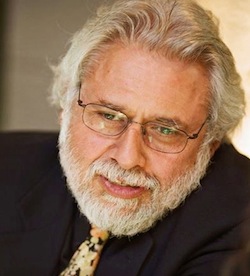Frank Moretti, Technology Leader and Philosopher, Has Passed Away
Moretti co-founded and led the Columbia Center for New Media Teaching and Learning (CCNMTL) and launched the software company Learn Technologies Interactive. He was also the long-time President of the Black Rock Forest Consortium, an alliance of colleges and universities, public and independent schools, and leading scientific and cultural institutions that promotes scientific research, education, and conservation in the Black Rock Forest north of New York City. TC joined the Consortium this spring.
“Frank was a strong and wise presence for many years at Teachers College and Columbia University who played numerous roles and made multiple contributions to education,” said Thomas James, TC Provost.
A high school teacher who wrote his TC dissertation on Roman funerals as a form of public pedagogy, Moretti came to national prominence during the early 1990s as Associate Headmaster at the Dalton School, a private co-educational day school in New York City. At Dalton he and his TC thesis advisor and close friend Robbie McClintock equipped classrooms and corridors with workstations for teachers and students, a dedicated server, and an industrial-scale local area network that linked teachers and students to Dalton’s library, New York City cultural institutions and—via email—each other. The project was considered so cutting-edge that Time magazine devoted a feature story to it titled “The Learning Revolution.” The story describes Dalton sixth-graders simulating an archeological dig at an ancient Assyrian site while tapping into collections at the Metropolitan Museum of Art, and seniors using a program called Voyager to look at images of stars and nebulae recorded by the telescope at California’s Palomar Observatory.
The more broad-based Dalton Technology Plan and resulting Dalton New Laboratory for Teaching and Learning have become internationally recognized models.
“Frank was a man of immense vitality, wide learning, and generous spirit—unique and irreplaceable,” said McClintock, TC’s John L. and Sue Ann Weinberg Professor Emeritus in the Historical and Philosophical Foundations of Education. From 1988-1992 Moretti worked with McClintock as Co-Director of TC’s Institute for Learning Technologies.
“He was an educator of genius who spoke directly, meaningfully, to countless young persons,” McClintock said. “Quick to perceive each person’s potential, interest, anxiety, curiosity, and concern, he engaged each in active thinking, valuing, and feeling. He had an unmatched knack for designing powerful curricula such as Archaeotype, creating opportunities for students to exercise their curiosity about matters of intrinsic interest and importance.”
McClintock added on a more personal note, “Frank and I were both only children and thought of each other as the closest we would come to having a brother.”
Moretti frequently credited McClintock with helping to shape his ideas about education and, in particular, with sharing an epiphany about the importance of technology.
“[Robbie] and I taught human communications, about the emergence of printing and the formation of nation states,” Moretti recalled in a profile in TC Today magazine in 2009. “We looked at what was going on around us with computers, and we said, ‘Jeez, we’re living in another great revolution.’”
Since 1999, Moretti has served as executive director of CCNMTL, which he co-founded with Maurice Matiz. Housed on Columbia’s Morningside campus in Butler Library and Lewisohn Hall, as well as at the 168th Street medical center, CCNMTL serves all 18 schools within the university, as well as more than 3,000 faculty members. Under Moretti’s leadership, the Center has helped introduce technologies such as CourseWorks, an online course management system that supports 6,000 offices of instruction, and VITAL, a tool co-developed by TC cognitive psychologist Herbert Ginsburg that archives video and embeds it, footnote-style, in text, so that academic papers become multimedia presentations.
At TC the Center helped create the TR@TC urban teacher residency program. The Center also served as the lead partner with WGBH Public Television in Boston in creating “Vietnam Online,” a digital library anchored by footage from the station’s landmark 1980s documentary Vietnam: A Television Experience. Moretti engaged faculty from across TC — including Margaret Crocco and William Gaudelli, who produced their “Vietnam Now” curriculum.
“We’re information consultants who promote the purposeful use of technology in education,” said Moretti. Yet he always retained a philosopher's outlook. “Twitter, Facebook—who ever thought capitalism would get to the point where the product is created by the consumer?” he said to TC Today. “Marx would have loved it!”
Moretti is survived by his wife, Robin Stern, a psychoanalyst and author who serves as Adjunct Assistant Professor of Education at Teachers College; and by his children from two marriages: Nkirote Mwaria, Antonio Moretti and Niccolo Moretti, and Scott and Melissa. Another son, Kathurima Mwaria, is deceased.
Published Tuesday, Jul. 16, 2013
